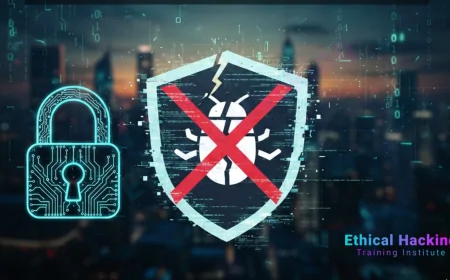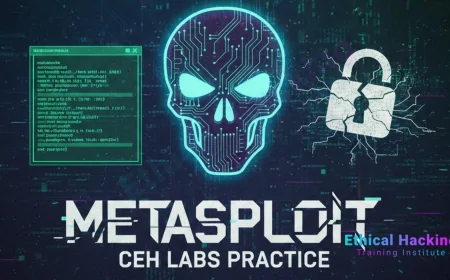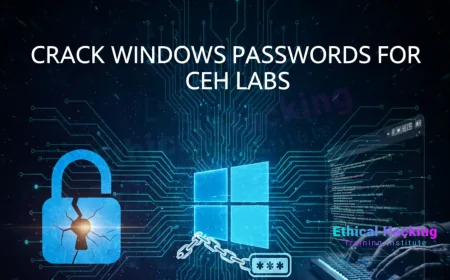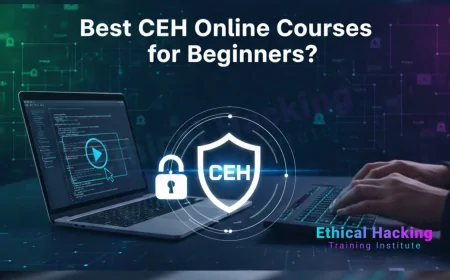Top Government Certified Ethical Hacking Institutes in Pune | 2025 Career Guide
Discover the top government certified ethical hacking institutes in Pune. Explore career benefits, curriculum highlights, certification details, and how these training programs can boost your cybersecurity career in 2025. Get hands-on skills with practical learning and expert guidance.
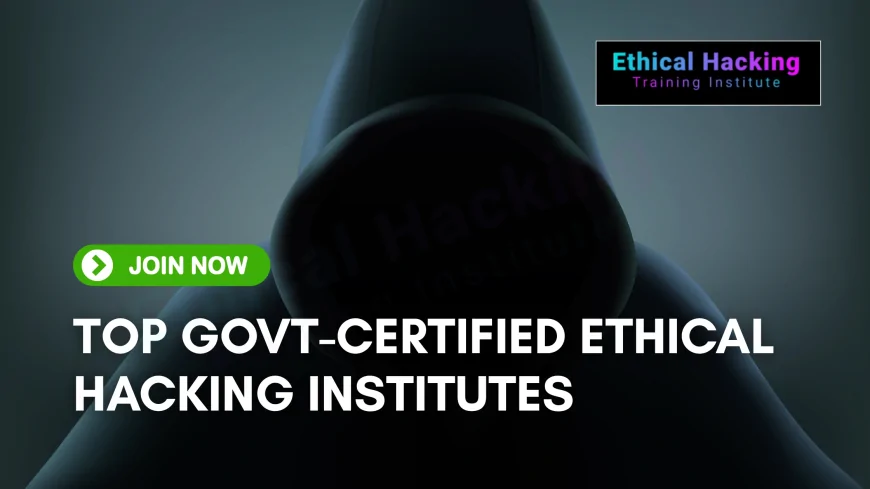
If you're seeking government-certified ethical hacking training in Pune, it's essential to understand the landscape of certifications and training programs available. This guide provides an overview of recognized certifications, training methodologies, and career prospects in ethical hacking, without referencing specific institutions.
Understanding Government-Certified Ethical Hacking Training
What Constitutes Government Certification?
In India, certain ethical hacking certifications are recognized or supported by government bodies. For instance, the Certified Ethical Hacker (CEH) certification, developed by the EC-Council, is widely acknowledged and often aligns with government standards for cybersecurity professionals. Additionally, programs like the National Security Database (NSD), developed in collaboration with Indian government agencies, aim to identify and certify cybersecurity experts capable of protecting national infrastructure.
Importance of Government-Recognized Certifications
Holding a government-recognized certification can enhance your credibility and employability, especially for roles in public sector organizations or projects involving national security. These certifications often require rigorous assessments, ensuring that certified professionals possess the necessary skills and ethical standards.
Key Features of Ethical Hacking Training Programs in Pune
Comprehensive Curriculum
Ethical hacking training programs typically cover a broad range of topics, including:
-
Network security and defense mechanisms
-
Penetration testing methodologies
-
Web application security
-
Malware analysis and reverse engineering
-
Cryptography and data protection
-
Mobile and wireless security
-
Cloud security fundamentals
These topics ensure that learners are well-equipped to handle various cybersecurity challenges.
Hands-On Training and Practical Labs
Effective ethical hacking training emphasizes practical experience. Programs often include hands-on labs, real-world simulations, and projects that allow learners to apply theoretical knowledge. This approach helps in understanding the complexities of cybersecurity threats and defense strategies.
Flexible Learning Options
Recognizing the diverse needs of learners, training programs in Pune offer various learning modes:
-
Instructor-Led Online Training: Live sessions conducted over the internet, allowing interactive learning from any location.
-
Classroom Training: In-person sessions providing direct interaction with instructors and peers.
-
Hybrid Models: A combination of online and offline sessions, offering flexibility and comprehensive coverage.
These options cater to students, working professionals, and corporate teams.
Certification and Career Support
Upon completion of the training, participants often receive a certification that validates their skills. Some programs also offer career support services, including resume building, interview preparation, and job placement assistance, enhancing employability in the cybersecurity field.
Career Prospects After Ethical Hacking Training
With the increasing reliance on digital infrastructure, the demand for cybersecurity professionals is on the rise. Completing a government-recognized ethical hacking training program can open doors to various roles, such as:
-
Security Analyst: Monitoring and analyzing security systems to prevent breaches.
-
Penetration Tester: Simulating cyberattacks to identify vulnerabilities.
-
Security Consultant: Advising organizations on best practices for securing their digital assets.
-
Network Security Engineer: Designing and implementing secure network solutions.
These roles are critical in both private and public sectors, including IT companies, financial institutions, and government agencies.
Choosing the Right Training Program
When selecting an ethical hacking training program in Pune, consider the following factors:
-
Accreditation: Ensure the program is recognized by relevant government bodies or industry standards.
-
Curriculum: Look for comprehensive coverage of essential cybersecurity topics.
-
Practical Exposure: Opt for programs that offer hands-on labs and real-world simulations.
-
Flexibility: Choose a learning mode that fits your schedule and learning preferences.
-
Career Services: Consider programs that provide support in job placement and career advancement.
FAQ's
1. What is a government-certified ethical hacking course in Pune?
A government-certified ethical hacking course in Pune is a cybersecurity training program approved or affiliated with government bodies or accreditation councils. These programs ensure a standardized curriculum, practical training, and recognized certification, enhancing your employability in cybersecurity roles across private and public sectors.
2. Are ethical hacking courses in Pune recognized by the government?
Yes, many ethical hacking courses in Pune are recognized by government-backed certification bodies or industry-approved councils. These programs follow nationally approved curricula and meet professional standards, making the certification valid for government and private cybersecurity jobs.
3. What are the benefits of enrolling in a government-certified ethical hacking institute in Pune?
Government-certified courses offer credibility, recognized certification, practical lab-based learning, and updated industry curriculum. Completing such a course boosts your resume, increases job prospects in cybersecurity roles, and qualifies you for both private and public sector opportunities.
4. What is the duration of a government-certified ethical hacking course in Pune?
Typically, these courses range from 1 month (for beginners) to 6 months (for advanced certification), depending on the depth of the syllabus and whether it's part-time or full-time. Short-term summer programs are also popular among students and working professionals.
5. What topics are covered in these courses?
Courses usually cover network security, malware analysis, penetration testing, web application security, SQL injection, system hacking, cryptography, wireless hacking, and ethical hacking laws. Emphasis is placed on both theoretical concepts and practical tools like Kali Linux, Metasploit, and Wireshark.
6. Is prior experience needed to enroll in ethical hacking courses in Pune?
No, most beginner-level government-certified programs require only basic computer and networking knowledge. However, for advanced certifications, familiarity with operating systems, programming (e.g., Python), and security concepts may be preferred.
7. Can I get a job after completing a government-certified ethical hacking course in Pune?
Yes, many institutes offer placement assistance. After completing the course, you can apply for roles such as penetration tester, SOC analyst, information security analyst, or cybersecurity consultant in IT companies, banks, and defense sectors.
8. What tools will I learn during ethical hacking training?
You'll gain hands-on experience with tools like Kali Linux, Nmap, Metasploit, Wireshark, Burp Suite, John the Ripper, Aircrack-ng, and more. These are standard in the industry for vulnerability testing, sniffing, password cracking, and wireless penetration testing.
9. Is ethical hacking a good career option in 2025?
Absolutely. With rising cyber threats, ethical hackers are in high demand. Organizations across sectors need professionals to secure their systems. Ethical hacking offers strong growth, job stability, and excellent salary potential in 2025 and beyond.
10. What are the eligibility criteria for government-certified ethical hacking institutes in Pune?
Candidates should ideally have completed 10+2 or be pursuing/graduated in IT, engineering, or related fields. Some institutes may also admit working professionals and students from other backgrounds with a basic understanding of computers.
11. Are weekend or online batches available in Pune?
Yes, most government-certified institutes in Pune offer flexible training modes including weekend, evening, and online batches to cater to students and working professionals. Live labs, recorded sessions, and real-time project support are often included in online training.
12. What kind of certification will I receive after completing the course?
Upon successful completion, you will receive a government-recognized ethical hacking certification. This could be affiliated with national skill development councils or security bodies, and it's highly valued in cybersecurity hiring across sectors.
13. What is the average fee for a government-certified ethical hacking course in Pune?
Fees vary depending on the course level and duration. On average, a certified course can cost between ₹15,000 to ₹60,000. Some institutes may also offer scholarships or government-subsidized programs under digital skill initiatives.
14. Will I get practical experience during training?
Yes, government-certified courses focus heavily on practical training. You’ll work in virtual labs, perform simulated attacks, and handle real-world security scenarios, ensuring you're job-ready with hands-on expertise in tools and techniques.
15. Are these certifications valid internationally?
While government certifications are highly valued in India, their international recognition depends on the affiliation. Some programs include training aligned with global standards like CompTIA Security+ or CEH frameworks, improving international job prospects.
16. Can I pursue ethical hacking part-time while studying or working?
Yes, many institutes in Pune offer part-time, evening, or weekend batches to accommodate students and professionals. This allows you to upgrade your skills without interrupting your current academic or work commitments.
17. How do I verify if an institute is government certified?
Check the institute’s official website or inquire directly. Look for affiliations with NSDC (National Skill Development Corporation), NIELIT, or MEITY. Authentic institutes usually display their accreditation clearly in brochures and admission forms.
18. What job roles can I apply for after the course?
Graduates can apply for roles like Ethical Hacker, Penetration Tester, SOC Analyst, Network Security Engineer, Security Consultant, and Information Security Auditor. Some may also land internships or freelance bug bounty opportunities.
19. Is ethical hacking legal in India?
Yes, ethical hacking is legal when performed with proper authorization and purpose, typically for strengthening cybersecurity. The training emphasizes laws, compliance, and professional ethics to ensure responsible and legal use of hacking skills.
20. What is the average salary after completing this course in Pune?
Entry-level ethical hackers in Pune can expect ₹3–6 LPA, depending on their skills and certification. With experience, salaries can rise to ₹10 LPA or more, especially in specialized roles like penetration testing and security architecture.
Start Your Professional Hacking Career Today
Pursuing government-certified ethical hacking training in Pune equips you with the skills and credentials needed to excel in the cybersecurity domain. With comprehensive curricula, practical training, and recognized certifications, these programs prepare you to tackle the evolving challenges in digital security and contribute effectively to safeguarding information systems.
What's Your Reaction?
 Like
0
Like
0
 Dislike
0
Dislike
0
 Love
0
Love
0
 Funny
0
Funny
0
 Angry
0
Angry
0
 Sad
0
Sad
0
 Wow
0
Wow
0
